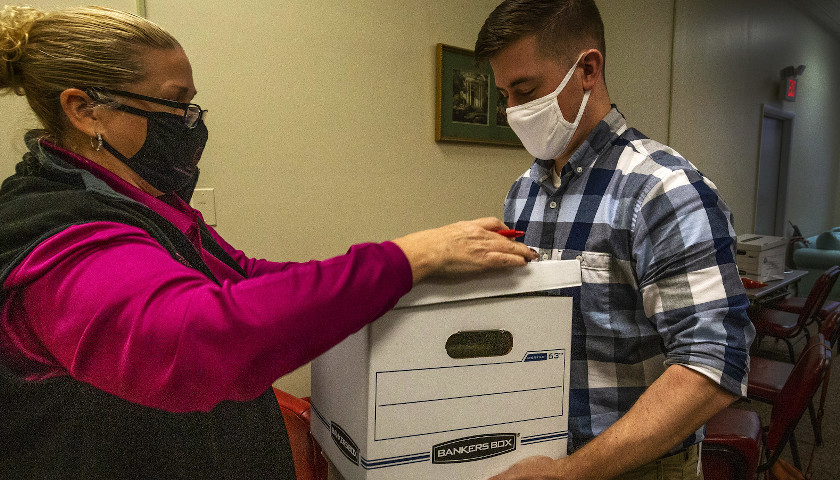by Julie Kelly
An October 29 story in the Philadelphia Inquirer reported that election officials in several Pennsylvania counties were debating how to alert voters that their mail-in ballot might not meet state requirements. “Officials across Pennsylvania are trying to help voters fix mail ballots that would otherwise be disqualified because of technical mistakes in completing them, creating a patchwork of policies around how—or even whether—people are notified and given a chance to make their votes count,” reporter Jonathan Lai explained. Some jurisdictions were contacting voters directly; one county, according to the paper, sent the “flawed” ballots back to the voters.
But there was a much bigger story behind Lai’s article: Election officials clearly violated the law by inspecting mail-in ballots before November 3. According to Pennsylvania’s election rules, county election boards were required to “safely keep the ballots in sealed or locked containers” until pre-canvassing legally began at 7 a.m. on Election Day.
Not only were an unknown number of mail-in ballots mishandled by election workers days before the official start date, election observers were not present at the premature inspections.
The state’s election code clearly states:
[T]he county board of elections shall meet no earlier than seven o’clock A.M. on election day to pre-canvass all ballots received prior to the meeting. A county board of elections shall provide at least forty-eight hours’ notice of a pre-canvass meeting by publicly posting a notice of a pre-canvass meeting on its publicly accessible Internet website. One authorized representative of each candidate in an election and one representative from each political party shall be permitted to remain in the room in which the absentee ballots and mail-in ballots are pre-canvassed.
Roughly 2.5 million Pennsylvanians voted absentee in the general election; nearly 2 million of those votes were cast for Joe Biden. One analysis found rejection rates for Pennsylvania mail-in ballots was 30 times lower this year compared to 2016.
While the president’s lawyers have fixated on hard-to-prove, complex allegations of software rigging and “seized” servers overseas, the more obvious instances of provable voter fraud, especially in the Keystone State, remain mostly ignored. In a fair world, or a country that still takes itself seriously, political leaders of both parties would demand a do-over of Pennsylvania’s election. Rules were changed at the last minute, ballot “curing” guidance inconsistently applied before and after Election Day, and none of the results in other races are in line with a decisive Biden victory.
Take, for example, the fact that Pennsylvania’s incumbent state treasurer—a Democrat—was soundly defeated by a Republican challenger. Joe Torsella, considered a 2022 U.S. Senate or gubernatorial candidate, lost by nearly 80,000 votes. “Torsella’s loss marks the first time since 1994 that a Republican beat an incumbent Democratic statewide officeholder and caps a brutal election cycle for Pennsylvania Democrats in down-ballot races,” the Pittsburgh Post-Gazette reported on November 11.
Biden received nearly 224,000 more votes than Torsella; the difference between Donald Trump and Torsella’s Republican opponent was less than 90,000 votes. A Republican also won Pennsylvania’s auditor general’s race by nearly 200,000 votes. In the state’s 17th Congressional District, Democratic incumbent Conor Lamb barely survived an upset by Republican Sean Parnell in a race most experts rated as a secure Democratic hold.
And in an even bigger shock, Frank Dermody, the Democratic minority leader of the Pennsylvania state legislature, lost the seat he occupied for 30 years to a Republican.
In 2020 the mood of the Pennsylvania electorate—and the country in general—clearly favored Republicans, which makes Biden’s 80,000-vote advantage over the president dubious at best, illegitimate at worse. Nonetheless, after an Obama-appointed judge over the weekend dismissed the Trump campaign’s plea to delay certifying the results, Pennsylvania Secretary of State Kathy Bookvar, a Democrat, is expected to make Biden’s victory there official on Monday.
But Pennsylvania Republicans aren’t giving up yet. Parnell and U.S. Representative Mike Kelly (R-Pa.) just filed a lawsuit that claimed Act 77, the law signed in 2019 by Democratic Governor Tom Wolf to extensively relax the state’s mail-in voting rules, including a “no excuse needed” provision, is unconstitutional. “Mail-in voting, in the form implemented through Act 77 is an attempt by the legislature to fundamentally overhaul the Pennsylvania voting system and permit universal, no excuse, mail-in voting absent any constitutional authority.”
Republican state lawmakers are threatening to subpoena executives from Dominion Voting Systems after the company backed out of a scheduled public hearing last week. Dominion is at the center of widespread concerns over unexplained “glitches” and last-minute software updates. In a press conference on November 20, one outraged Republican state legislator accused the company of “retreating into the darkness” and refusing to answer questions about the reliability of its voting machines.
Take, for example, the fact that Pennsylvania’s incumbent state treasurer—a Democrat—was soundly defeated by a Republican challenger. Joe Torsella, considered a 2022 U.S. Senate or gubernatorial candidate, lost by nearly 80,000 votes. “Torsella’s loss marks the first time since 1994 that a Republican beat an incumbent Democratic statewide officeholder and caps a brutal election cycle for Pennsylvania Democrats in down-ballot races,” the Pittsburgh Post-Gazette reported on November 11.
Biden received nearly 224,000 more votes than Torsella; the difference between Donald Trump and Torsella’s Republican opponent was less than 90,000 votes. A Republican also won Pennsylvania’s auditor general’s race by nearly 200,000 votes. In the state’s 17th Congressional District, Democratic incumbent Conor Lamb barely survived an upset by Republican Sean Parnell in a race most experts rated as a secure Democratic hold.
And in an even bigger shock, Frank Dermody, the Democratic minority leader of the Pennsylvania state legislature, lost the seat he occupied for 30 years to a Republican.
In 2020 the mood of the Pennsylvania electorate—and the country in general—clearly favored Republicans, which makes Biden’s 80,000-vote advantage over the president dubious at best, illegitimate at worse. Nonetheless, after an Obama-appointed judge over the weekend dismissed the Trump campaign’s plea to delay certifying the results, Pennsylvania Secretary of State Kathy Bookvar, a Democrat, is expected to make Biden’s victory there official on Monday.
But Pennsylvania Republicans aren’t giving up yet. Parnell and U.S. Representative Mike Kelly (R-Pa.) just filed a lawsuit that claimed Act 77, the law signed in 2019 by Democratic Governor Tom Wolf to extensively relax the state’s mail-in voting rules, including a “no excuse needed” provision, is unconstitutional. “Mail-in voting, in the form implemented through Act 77 is an attempt by the legislature to fundamentally overhaul the Pennsylvania voting system and permit universal, no excuse, mail-in voting absent any constitutional authority.”
Republican state lawmakers are threatening to subpoena executives from Dominion Voting Systems after the company backed out of a scheduled public hearing last week. Dominion is at the center of widespread concerns over unexplained “glitches” and last-minute software updates. In a press conference on November 20, one outraged Republican state legislator accused the company of “retreating into the darkness” and refusing to answer questions about the reliability of its voting machines.
– – –
Julie Kelly is a political commentator and senior contributor to American Greatness. She is the author of Disloyal Opposition: How the NeverTrump Right Tried―And Failed―To Take Down the President Her past work can be found at The Federalist and National Review. She also has been featured in the Wall Street Journal, The Hill, Chicago Tribune, Forbes, and Genetic Literacy Project.




